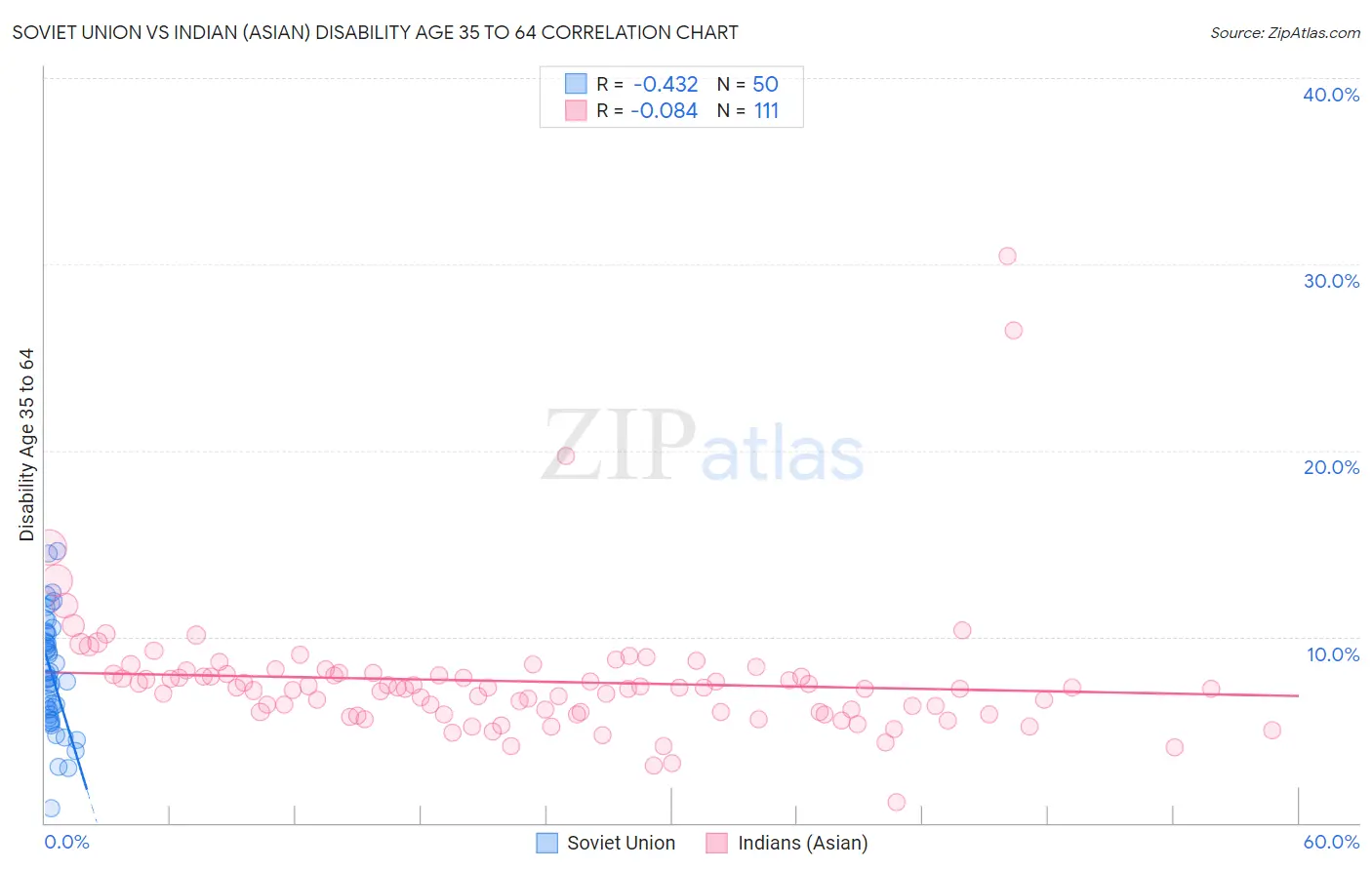Soviet Union vs Indian (Asian) Disability Age 35 to 64
COMPARE
Soviet Union
Indian (Asian)
Disability Age 35 to 64
Disability Age 35 to 64 Comparison
Soviet Union
Indians (Asian)
9.2%
DISABILITY AGE 35 TO 64
100.0/ 100
METRIC RATING
18th/ 347
METRIC RANK
8.9%
DISABILITY AGE 35 TO 64
100.0/ 100
METRIC RATING
12th/ 347
METRIC RANK
Soviet Union vs Indian (Asian) Disability Age 35 to 64 Correlation Chart
The statistical analysis conducted on geographies consisting of 43,509,630 people shows a moderate negative correlation between the proportion of Soviet Union and percentage of population with a disability between the ages 34 and 64 in the United States with a correlation coefficient (R) of -0.432 and weighted average of 9.2%. Similarly, the statistical analysis conducted on geographies consisting of 494,627,255 people shows a slight negative correlation between the proportion of Indians (Asian) and percentage of population with a disability between the ages 34 and 64 in the United States with a correlation coefficient (R) of -0.084 and weighted average of 8.9%, a difference of 4.5%.

Disability Age 35 to 64 Correlation Summary
| Measurement | Soviet Union | Indian (Asian) |
| Minimum | 0.79% | 1.1% |
| Maximum | 14.6% | 30.4% |
| Range | 13.8% | 29.3% |
| Mean | 8.0% | 7.6% |
| Median | 7.8% | 7.3% |
| Interquartile 25% (IQ1) | 5.8% | 5.9% |
| Interquartile 75% (IQ3) | 10.1% | 8.0% |
| Interquartile Range (IQR) | 4.3% | 2.1% |
| Standard Deviation (Sample) | 3.0% | 3.6% |
| Standard Deviation (Population) | 2.9% | 3.6% |
Demographics Similar to Soviet Union and Indians (Asian) by Disability Age 35 to 64
In terms of disability age 35 to 64, the demographic groups most similar to Soviet Union are Immigrants from Venezuela (9.3%, a difference of 0.24%), Burmese (9.2%, a difference of 0.41%), Immigrants from Argentina (9.3%, a difference of 0.75%), Okinawan (9.4%, a difference of 1.2%), and Cypriot (9.4%, a difference of 1.2%). Similarly, the demographic groups most similar to Indians (Asian) are Immigrants from South Central Asia (8.9%, a difference of 0.090%), Immigrants from Singapore (8.9%, a difference of 0.69%), Immigrants from Eastern Asia (8.8%, a difference of 0.78%), Bolivian (8.9%, a difference of 0.98%), and Immigrants from Korea (9.0%, a difference of 1.3%).
| Demographics | Rating | Rank | Disability Age 35 to 64 |
| Immigrants | Iran | 100.0 /100 | #5 | Exceptional 8.5% |
| Thais | 100.0 /100 | #6 | Exceptional 8.6% |
| Immigrants | Israel | 100.0 /100 | #7 | Exceptional 8.6% |
| Iranians | 100.0 /100 | #8 | Exceptional 8.7% |
| Immigrants | China | 100.0 /100 | #9 | Exceptional 8.7% |
| Immigrants | Bolivia | 100.0 /100 | #10 | Exceptional 8.7% |
| Immigrants | Eastern Asia | 100.0 /100 | #11 | Exceptional 8.8% |
| Indians (Asian) | 100.0 /100 | #12 | Exceptional 8.9% |
| Immigrants | South Central Asia | 100.0 /100 | #13 | Exceptional 8.9% |
| Immigrants | Singapore | 100.0 /100 | #14 | Exceptional 8.9% |
| Bolivians | 100.0 /100 | #15 | Exceptional 8.9% |
| Immigrants | Korea | 100.0 /100 | #16 | Exceptional 9.0% |
| Burmese | 100.0 /100 | #17 | Exceptional 9.2% |
| Soviet Union | 100.0 /100 | #18 | Exceptional 9.2% |
| Immigrants | Venezuela | 100.0 /100 | #19 | Exceptional 9.3% |
| Immigrants | Argentina | 100.0 /100 | #20 | Exceptional 9.3% |
| Okinawans | 100.0 /100 | #21 | Exceptional 9.4% |
| Cypriots | 100.0 /100 | #22 | Exceptional 9.4% |
| Argentineans | 100.0 /100 | #23 | Exceptional 9.4% |
| Asians | 100.0 /100 | #24 | Exceptional 9.4% |
| Venezuelans | 100.0 /100 | #25 | Exceptional 9.4% |